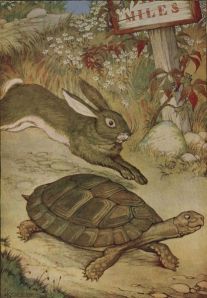 If I had sat down to write this piece yesterday morning it would have been very different. As it was, since I was forced to wait by virtue of being at work, I had time to ruminate for many an hour on this simple thought: people need to slow the heck down. Everyone is running too fast. Certainly they are in my neck of the woods. By the way how do woods get necks anyway? After ruminating, chewing the cud as it were, I was handed a magazine called Good. I haven't seen this magazine before but I bought this issue immediately because the cover proclaimed: Slow Down; perspectives on a smarter, better, and slower future. Leafing through the articles on driving slower, Slow Food, and building things to last reflects many of the thoughts that had been tumbling like stones in my brain, slowly being polished in anticipation of this essay.
If I had sat down to write this piece yesterday morning it would have been very different. As it was, since I was forced to wait by virtue of being at work, I had time to ruminate for many an hour on this simple thought: people need to slow the heck down. Everyone is running too fast. Certainly they are in my neck of the woods. By the way how do woods get necks anyway? After ruminating, chewing the cud as it were, I was handed a magazine called Good. I haven't seen this magazine before but I bought this issue immediately because the cover proclaimed: Slow Down; perspectives on a smarter, better, and slower future. Leafing through the articles on driving slower, Slow Food, and building things to last reflects many of the thoughts that had been tumbling like stones in my brain, slowly being polished in anticipation of this essay.Was it serendipity or fate that I was thinking 'Slow Down' just before someone handed me a magazine of the same thought? I think it was synergistic. It's time we all start slowing right down before we grind to a messy halt altogether. Drive too fast and you risk crashing. Oh yeah, you think you have to get somewhere in a hurry? You need to save a few minutes of your precious on the go multitasking lifestyle? You save no time when you end up in the emergency room, or on the mortician's steely slab. Worse yet you save no time when you put someone else there. Are you saving time when you rush through all of life's experiences to get to the next one? We're choking on our fast food lunches. We're giving ourselves ulcers and cancer and diabetes. We're speeding by so fast, all so we can get to the grave just that bit faster. And fast people are cranky people. Trust me. I have to deal with them every day at work and on the road.
Life expectancy might be higher than ever, but I have a feeling that the humble farmer of a century or two ago, plowing the soil, moving through the seasons at a sedate rhythm, even if he lived less years than you will, had a longer life for he was there for almost every minute of it, rather than rushing through them so that they die like bugs on your windshield.
I've looked at some of the other sites and articles about slowing down, and most of them seem to focus on relaxing more and doing less. I'm not necessarily going to say you should stop reading your email, or spend more time in bed, but I am going to say that I am determined to do everything with a little more deliberation, a lot less rush, and always allow time for stopping, smelling the roses, and just plain breathing while I absorb the experiences I'm having, instead of always projecting my thoughts into the future, ignoring the now. I'm going to cook my food, eat less of it on the run, spend time in the garden, write without distractions, drive at the speed limit, not honk or cut people off, or drive so fast through the pouring rain I take out someone's beloved pet. I promise to appreciate the moments of my life. No matter how I do the math I'm at least halfway through my life and many days, weeks, months, and maybe years of it I have spent in a speedy blur where I can't remember what I did or why I did it. I promise not to waste what's left. I'm going to slow down slow.
Join me in slowing down on my new Facebook page: Slow Down Slow - let's see if we can start spreading the word and making a difference to the quality of life. I'll also be including other articles on slowing down, multitasking less, and related topics here on my blog in the future.







